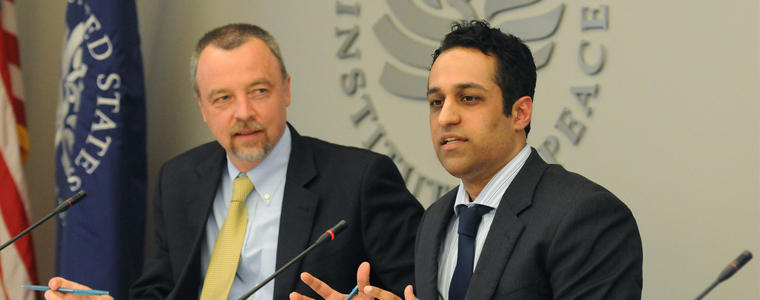Pakistan's 2013 Elections: Assessing the Results and Impacts
On May 14, 2013, the U.S. Institute of Peace held a panel discussion on the results of Pakistan’s May 11th elections, and the implications of these results for both for Pakistan, as well as U.S.-Pakistan relations.
Read the event coverage, Pakistan Election Victory for Sharif May Spur Change, Experts Say

Pakistan’s general election scheduled for May 11th, 2013, will mark a further milestone in the country’s democratic development. While previous elected governments in Pakistan have completed their full terms in office, and political power has been peacefully transferred, expectations have been high that the 2013 elections would be the most free and fair ever in Pakistan’s history. This is in part due to the greater independence of the Election Commission of Pakistan, as well as the relatively “hands off” role being played by the Pakistan military and intelligence agencies relative to past elections. However, the dramatic increase this past month in attacks by Islamist militant groups on candidates, political party workers and election offices, primarily targeting political parties viewed as “secular” in the Pakistan contest – in particular the Awami National Party (ANP), the Muttahida Qaumi Movement (MQM) and the Pakistan People’s Party (PPP) – are now raising serious questions about how free and fair the elections will actually be.
Please join the U.S. Institute of Peace on May 14, 2013 from 2:00pm until 3:30pm, for a panel discussion on the results of Pakistan’s May 11th elections, and the implications of these results for both for Pakistan, as well as U.S.-Pakistan relations. This event will be webcasted live beginning at 2:00pm on May 14.
Speakers
- Safiya Ghori-Ahmad, Panelist
Pakistan Desk, U.S. Department of State - Arif Rafiq, Panelist
Adjunct Scholar, Middle East Institute - Moeed Yusuf, Panelist
South Asia Advisor, U.S. Institute of Peace - Andrew Wilder, Moderator
Director of Afghanistan and Pakistan Programs, U.S. Institute of Peace



